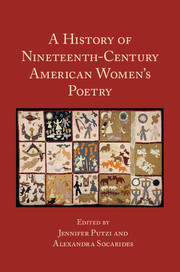Book contents
- Frontmatter
- Contents
- List of Illustrations
- List of Contributors
- Acknowledgments
- Introduction: Making History: Thinking about Nineteenth-Century American Women's Poetry
- PART I 1800–1840, AMERICAN POESIS AND THE NATIONAL IMAGINARY
- PART II 1840–1865, UNIONS AND DISUNIONS
- PART III 1865–1900, EXPERIMENT AND EXPANSION
- 17 Women Poets and American Literary Realism
- 18 Verse Forms
- 19 Braided Relations: Toward a History of Nineteenth-Century American Indian Women's Poetry
- 20 Frances Harper and the Poetry of Reconstruction
- 21 “hear the bird”: Sarah Piatt and the Dramatic Monologue
- 22 Women Writers and the Hymn
- 23 Women Poets, Child Readers
- 24 Emma Lazarus Transnational
- 25 The Creation of Emily Dickinson and the Study of Nineteenth-Century American Women's Poetry
- Suggested Further Reading
- Index
25 - The Creation of Emily Dickinson and the Study of Nineteenth-Century American Women's Poetry
from PART III - 1865–1900, EXPERIMENT AND EXPANSION
Published online by Cambridge University Press: 21 January 2017
- Frontmatter
- Contents
- List of Illustrations
- List of Contributors
- Acknowledgments
- Introduction: Making History: Thinking about Nineteenth-Century American Women's Poetry
- PART I 1800–1840, AMERICAN POESIS AND THE NATIONAL IMAGINARY
- PART II 1840–1865, UNIONS AND DISUNIONS
- PART III 1865–1900, EXPERIMENT AND EXPANSION
- 17 Women Poets and American Literary Realism
- 18 Verse Forms
- 19 Braided Relations: Toward a History of Nineteenth-Century American Indian Women's Poetry
- 20 Frances Harper and the Poetry of Reconstruction
- 21 “hear the bird”: Sarah Piatt and the Dramatic Monologue
- 22 Women Writers and the Hymn
- 23 Women Poets, Child Readers
- 24 Emma Lazarus Transnational
- 25 The Creation of Emily Dickinson and the Study of Nineteenth-Century American Women's Poetry
- Suggested Further Reading
- Index
Summary
In the July 1893 issue of the Atlantic Monthly, an aspiring woman poet published one late contribution of many to the nineteenth-century American vogue for sonnets – the writer's first and, as it turned out, her last notice by Boston's aging grande dame of nineteenth-century high literary culture:
GHOST-FLOWERS
( Monotropa uniflora .)
In shining groups, each stem a pearly ray,
Weird flecks of light within the shadowed wood,
They dwell aloof, a spotless sisterhood.
No Angelus, except the wild bird's lay,
Awakes these forest nuns; yet, night and day,
Their heads are bent, as if in prayerful mood.
A touch will mar their snow, and tempests rude
Defile; but in the mist fresh blossoms stray
From spirit-gardens, just beyond our ken.
Each year we seek their virgin haunts, to look
Upon new loveliness, and watch again
Their shy devotions near the singing brook;
Then, mingling in the dizzy stir of men
Forget the vows made in that cloistered nook.
The author of this unimpeachably correct Petrarchan sonnet was Mary Potter Thacher Higginson, previously the author of Seashore and Prairie, Stories and Sketches (1877); an occasional contributor of poetry to Harper's Magazine, Harper's Bazaar, Cosmopolitan, and other periodicals; and the second wife of the reformer, author, and editor Thomas Wentworth Higginson. In the summer of 1893, she and her husband were in the thick of negotiating with Thomas Niles, of the Boston-based publishing firm Roberts Brothers, for the rights and illustrations for a joint collection of their poetry; the July printing of “Ghost-Flowers” in the Atlantic served as a small advance notice for Such as They Are: Poems by Thomas Wentworth Higginson and Mary Thacher Higginson, which would be issued by Roberts Brothers in late 1893. The fate of the Higginsons’ joint volume, however, was predicted by its self-deprecatory title: Such as They Are sank into obscurity without drawing significant popular or critical notice.
The Atlantic's printing of “Ghost-Flowers,” followed in short order by the chastening of its author's hopes for her published volume of poetry, tells one typical story – reasonably typical at least with respect to her race and class stratum – of women's access to authorship in late nineteenth-century American poetry.
- Type
- Chapter
- Information
- A History of Nineteenth-Century American Women's Poetry , pp. 406 - 422Publisher: Cambridge University PressPrint publication year: 2016
- 1
- Cited by



